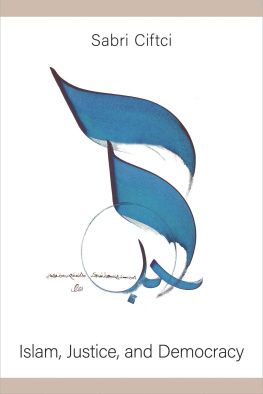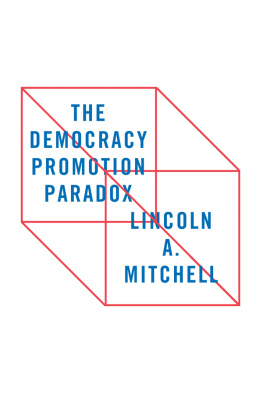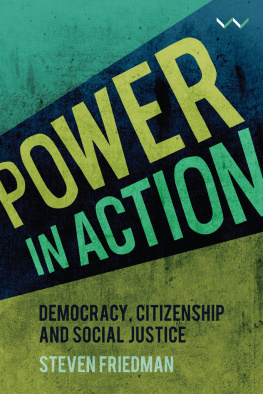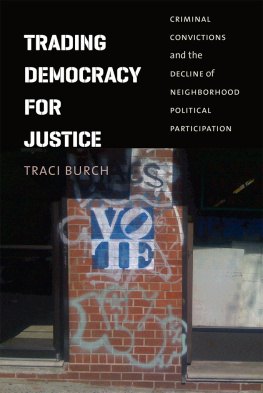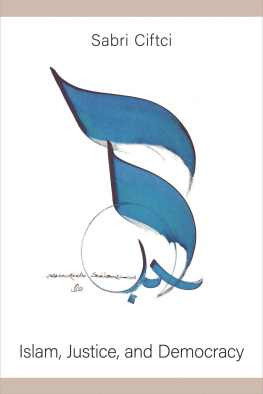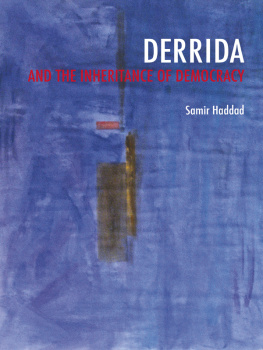Democracy and Justice
This book explores the possibilities offered by Derridas work on democracy for interpreting contemporary struggles over democracy in Turkey.
The relationship between democracy and justice seems of unquestionable importance to Derrida, with democracy and justice held in tension by deconstruction. Agnes Czajka offers a qualified endorsement of a just democracy, grounded in the possibilities opened up by reading Derridas work on democracy together with his work on justice. She posits that one way of imagining democracy-to-come might be to imagine it as a just democracy, or one poised at the intersection of the aporia of democracy and the (non)imperative to justice. In the particular context of contemporary struggles over democracy in Turkey, she also explores what such comportment toward a just democracy (or a justice of/in democracy) might look like in the context of that particular democracy.
Agnes Czajka is a lecturer in the Department of Politics & International Studies at the Open University. Her research interests include contemporary social and political thought, democracy, citizenship, contentious politics, European and Mediterranean politics, and refugee and migrant politics.
Routledge Advances in Democratic Theory
Edited by David Chandler and Paulina Tambakaki (both University ofWestminster)
Advisory Board: Benjamin Barber (City University of New York), Rajeev Bhargava (Centre for the Study of Developing Societies), Bhikhu Parekh (House of Lords), Fred Dallmayr (University of Notre Dame), John Keane (University of Sydney), Chantal Mouffe (University of Westminster)
Democracy is being re-thought almost everywhere today: with the widespread questioning of the rationalist assumptions of classical liberalism, and the implications this has for representational competition; with the Arab Spring, destabilizing many assumptions about the geographic spread of democracy; with the deficits of democracy apparent in the Eurozone crisis, especially as it affects Greece and Italy; with democracy increasingly understood as a process of social empowerment and equalization, blurring the lines of division between formal and informal spheres; and with growing demands for democracy to be reformulated to include the needs of those currently marginalized or even to include the representation of non-human forms of life with whom we share our planet.
Routledge Advances in Democratic Theory publishes state of the art theoretical reflection on the problems and prospects of democratic theory when many of the traditional categories and concepts are being reworked and rethought in our globalized and complex times.
The series is published in cooperation with the Centre for the Study of Democracy, University of Westminster, London, UK.
1. Nations and Democracy
New Theoretical Perspectives
Amanda Machin
2. Reclaiming Democracy
Judgment, Responsibility and the Right to Politics
Edited by Albena Azmanova and Mihaela Mihai
3. Performing Citizenship
Social Movements across the Globe
Edited by Inbal Ofer and Tamar Groves
4. Constrained Elitism and Contemporary Democratic Theory
Timothy Kersey
5. Democracy and Justice
Reading Derrida in Istanbul
Agnes Czajka

First published 2017
by Routledge
711 Third Avenue, New York, NY 10017
and by Routledge
2 Park Square, Milton Park, Abingdon, Oxon OX14 4RN
Routledge is an imprint of the Taylor & Francis Group, an informa business
2017 Taylor & Francis
The right of Agnes Czajka to be identified as author of this work has been asserted by her in accordance with sections 77 and 78 of the Copyright, Designs and Patents Act 1988.
All rights reserved. No part of this book may be reprinted or reproduced or utilised in any form or by any electronic, mechanical, or other means, now known or hereafter invented, including photocopying and recording, or in any information storage or retrieval system, without permission in writing from the publishers.
Trademark notice: Product or corporate names may be trademarks or registered trademarks, and are used only for identification and explanation without intent to infringe.
British Library Cataloguing in Publication Data
A catalogue record for this book is available from the British Library
Library of Congress Cataloging-in-Publication Data
Names: Czajka, Agnes, author.
Title: Democracy and justice : reading Derrida in Istanbul / by Agnes Czajka.
Description: New York, NY : Routledge is an imprint of the Taylor & Francis Group, an Informa Business, [2017] |
Series: Routledge advances in democratic theory ; 5 | Includes bibliographical references and index.
Identifiers: LCCN 2016019730 | ISBN 9781138910645 (hbk) | ISBN 9781315693330 (ebk)
Subjects: LCSH: Democracy--Turkey. | Social justice--Turkey. | Democracy--Philosophy. | Justice (Philosophy) | Turkey--Politics and government--Philosophy. | Derrida, Jacques. | Deconstruction.
Classification: LCC JQ1809.A15 C93 2017 | DDC 320.9561--dc23
LC record available at https://lccn.loc.gov/2016019730
ISBN: 978-1-138-91064-5 (hbk)
ISBN: 978-1-315-69333-0 (ebk)
On the evening of 17 June 2013 Erdem Gndz stopped in the centre of Istanbuls central square. Having cleared Gezi Park of the tents and bodies that had occupied it since May and banned all gatherings in the adjacent Taksim Square, the Turkish government had supressed one of the most decisive democratic struggles in modern Turkish history. But the genie was out of the bottle. That evening Gndz crossed the square, came to a stop in front of the Atatrk Cultural Centre, and stood there, first alone, then with dozens of others, for close to eight hours. The novelty of the coming politics, ventured Giorgio Agamben, is that it comprises a struggle between whatever singularity and the State, between the State and those who co-belong without any representable condition of belonging, who reject all identity and every condition of belonging.
Although Agambens argument is here taken somewhat out of context, and though the tanks did not appear to face the standing man (duran adam) or those who eventually stood with him a fleeting community of singularities the gesture left a mark. It went viral. The following day,
people began standing in other neighbourhoods around Istanbul and in cities around Turkey: a woman in Ankara stood in the spot where protestor Ethem Sarslk was shot by police on 1 June 2013 during the first days of the Gezi Park protests; another group stood at the spot where protestor Abdullah Cmert was killed by police; three men stood in the spot where Turkish-Armenian journalist Hrant Dink had been shot in 2007; people stood in front of newspaper offices that had failed to cover the protests; they stood in front of CNN Turk, which had famously showed a penguin documentary on 2 June instead of covering
The state was, if only momentarily, at a loss as to how to respond. Many, including the standing man himself, have since commented on the performance, which attracted international attention and imitation (Gndz received the German M100 Media Award for his commitment to freedom of speech and human rights). The standing community of singularities, which in subsequent days stretched far beyond the borders of Turkey, gestured not only toward the possibility of the kind of politics that Agamben saw coming, but also toward the kind of democracy that Jacques Derrida saw coming. And though the tanks may not have appeared that day, they havent been far away since.



